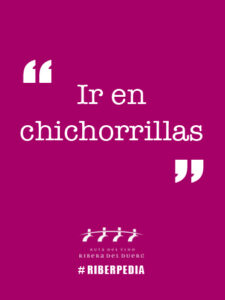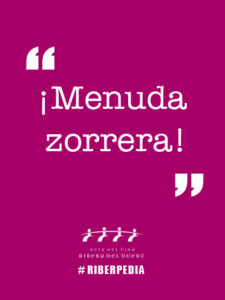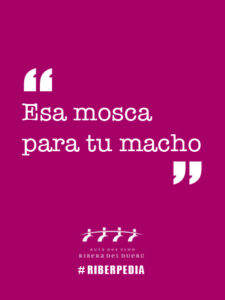Did you pass the first level? Well, let’s get on with the second part of our RIBERPEDIA, which is our particular way of encompassing words or expressions that we use throughout the 115 kilometres of our Ribera del Duero.
We are not going to entertain you with very technical words, but rather we are going to refer to words that are actually used. We don’t really know why so many swear words come to our heads, it must be that saying“cago en…” is in our DNA, don’t take it into account that we are more friendly than anything…
- Aviarse: from all our lives, it means to dress up.
- Abanto: here in the Ribera del Duero it usually means clumsy, dazed, so it’s better if this word doesn’t ring a bell.
- Almuenza: a portion that fits in two hands together. How many times have you counted like that?
- About the chamois: The chamois is the leather that is sewn on the inside edge of the beret to better fit the head and to prevent it from getting stained with sweat. It is made from tanned sheepskin (especially with natural products). Consequently, in some places, the belt (or sash) is called a beret. In any case, the beret should be worn with style, not “cochada” as they say in Roa to the one who wears it flattened. Expressions with a badana:
- Eres un badanas: lazy, lazy, lazy. Ay, ay, ay… Let’s get a move on!
- Very different is to shake or zurrar la badana, which means that you are going to “receive or collect”, similar to “que te unto”. This expression was used when you took the beret to remove dust, water or other things and has also derived this meaning.
- In en chichorras or en chichorrillas or ir como Dios nos (bien)trajo al mundo. Or also to go in chorrillas. But not in winter, we’re not so cool… In winter we don’t go in folguetas, in winter we wrap up warm.

- What a pigsty: yes, it looks like you live in a pigsty.
- The chiscón is like an attic, a place that’s kind of hidden and dark. If they send you there, too bad, because there are places where it’s used to refer to a prison…
- A guripa is a guard, a soldier and, consequently, a nickname.
- A knee is also a dishcloth.
- Menuda picia: what a mess, what a mess, what a mess, what a botched job.
- Tanguilla: a game that is still played (especially by the older people of Aranda). It is also known as the game of tuta and is very similar to skittles.
If we are talking about riverside flora and fauna:
- Tasugo is the badger and picaza is the magpie.
- A swallow is not the swallow’s husband, it is usually a pimple in the armpit.
- A zorrera: it is not the fox’s house, but the typical smoke produced, for example, by …. when making chops. Yum, yum!

- Los chínfanos is the classic Arandino name for mosquitoes – how annoying they are!
- Quitameriendas: they come out a lot at the end of the summer and they are purple.
- Zapatito del niño Jesús: this is a type of plant that grows in Caleruega. In Zazuar, for example, they are called Zapatitos de la Virgen.
- Pimpirigallo: it is used in Aranda to talk about poppies.
- You will find meaperros in Castrillo de la Vega and it is similar to mint.
Continuing with the world of food in Ribera del Duero:
- What did you put in your belt today? Maybe a good suckling lamb?
- What’s to eat? Thoughts, which are light🙂
- Lechuguino is a type of bread. In Roa, for example, they call it panete and, of course, it’s round.
- In Peñafiel try the coscoja. We won’t tell you what it is, let’s see if you can guess…
- When you take prepared food with you to work or on an excursion: the talega, the fardel or the alforjas.
- A lasca is a slice of ham, for example.
- Tortos de uva (grape cakes): grapes are also used for everything? You have to try this dessert!
Other expressions from the river:
- A mayores: it doesn’t matter when you use it. It means that you are going to get something else…
- Whose family are you from?: They’re not asking you to exchange you for camels, but to find out what family you belong to.
- Recóñale chiquito, ¡cómo has medrao!: Very heard in Soria’s Ribera del Duero. It doesn’t matter when you read it 🙂
- Se ha quedado’o buena tarde: Typical lift phrases.
- Esa mosca para tu macho: that’s what you do!

- Older than the banks of the Duero: well, that’s what they’re painting grey hairs…
- Verdes las han mgao: there’s nothing to be done. You can also say Voilas, uncle Roque.
- Cross the river on a leg… get up and roll up your sleeves!
The world of wine: we are in the Ribera del Duero!
- Garullo ( not garrulo, watch out, watch out cagüenlaleche) is a small sickle to initiate you in the arts of the grape harvest. Also called garillo.
- Bocoy: vat with a capacity of 30 to 50 cántaras.
- Beber a cacarela: to drink by squirting, without the wineskin or the porrón touching the lips.
- Acigüembre: green, unripe grape. It can also be a bush or, come on, whatever you want, let yourself be carried away by such a word!
- Estar pujao, estar embadurnao or cogerte “la eléctrica”: To drink more than you should…
- Marrano: wood used in the construction of the castle of a winepress.
- Lagareta: small individual winepress.
- Líneo: row of vines.
- Ringorrango: (when one abuses the wine, it happens that) he walks in zig zag…
- Turrumbón is the upper part of the entrance to the underground cellar, which is covered with earth. It is also called cabañón.
- No t’ esbarcies: meaning easy to deduce, don’t you think?
- To be “eslomao”. Not from the world of wine? Come on, grab a garullo and pull (start harvesting, we mean). Let’s see if this expression is not from the world of wine.
- Ojo gallo: it is a wine with a slightly darker colour than claret.
This is the second part of our particular RIBERPEDIA. PART ONE of the RIBERPEDIA here. Do you know any typical riparian word or expression that does not appear in the list? Tell us, tell us…
And, like everywhere else, if they tell us “no eggs”, we go and do it.
That’s why, with lots and lots of affection, we say to you: “What if you don’t have the balls to come to La Ribera? We are waiting for you with open arms.
Bibliography consulted:
- Fantastic book “Vocabulario de la Ribera del Duero” written by Arturo Martín Criado.
- Ribereños around the world, whatsapp groups, Facebook groups and regulars to the Ribera del Duero, who are the ones who differentiate what is characteristic of here (we already have it very internalised…).
- http://aldeadesanesteban.com/vocablos/
- Soria is in fashion.
- Whatsapp Group Ribera Cultural.
- Vocabulary Quintanilla de Tres Barrios by Leopoldo Torre García: http://soria-goig.com/vocabulario/pag_0609.htm
- Vocabulary from Alcozar: http://www.alcozar.net/diccionario/c.htm
- Vocabulary from Tubilla del Lago: http://tubilladellago.com/vocabulario.html




